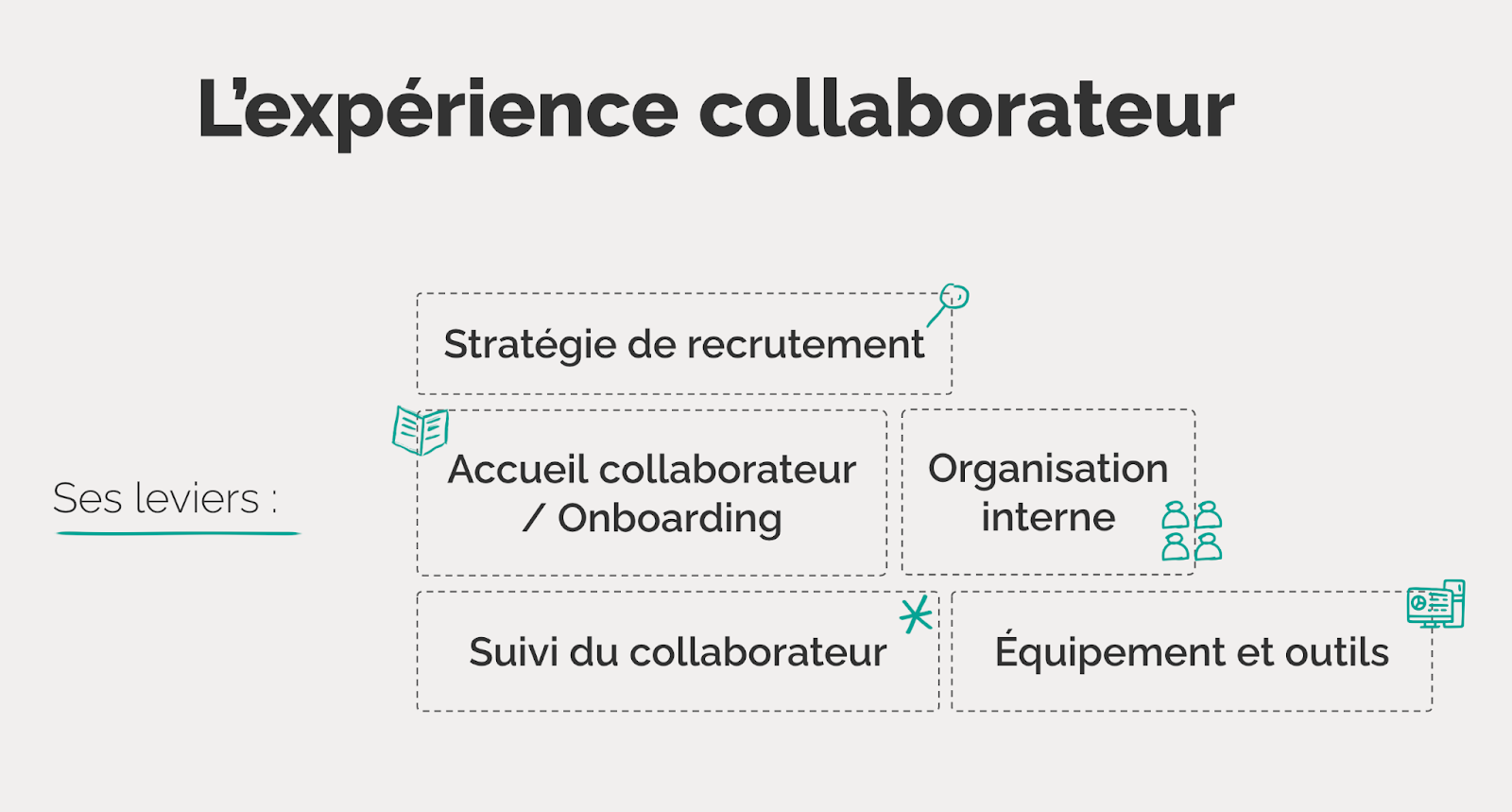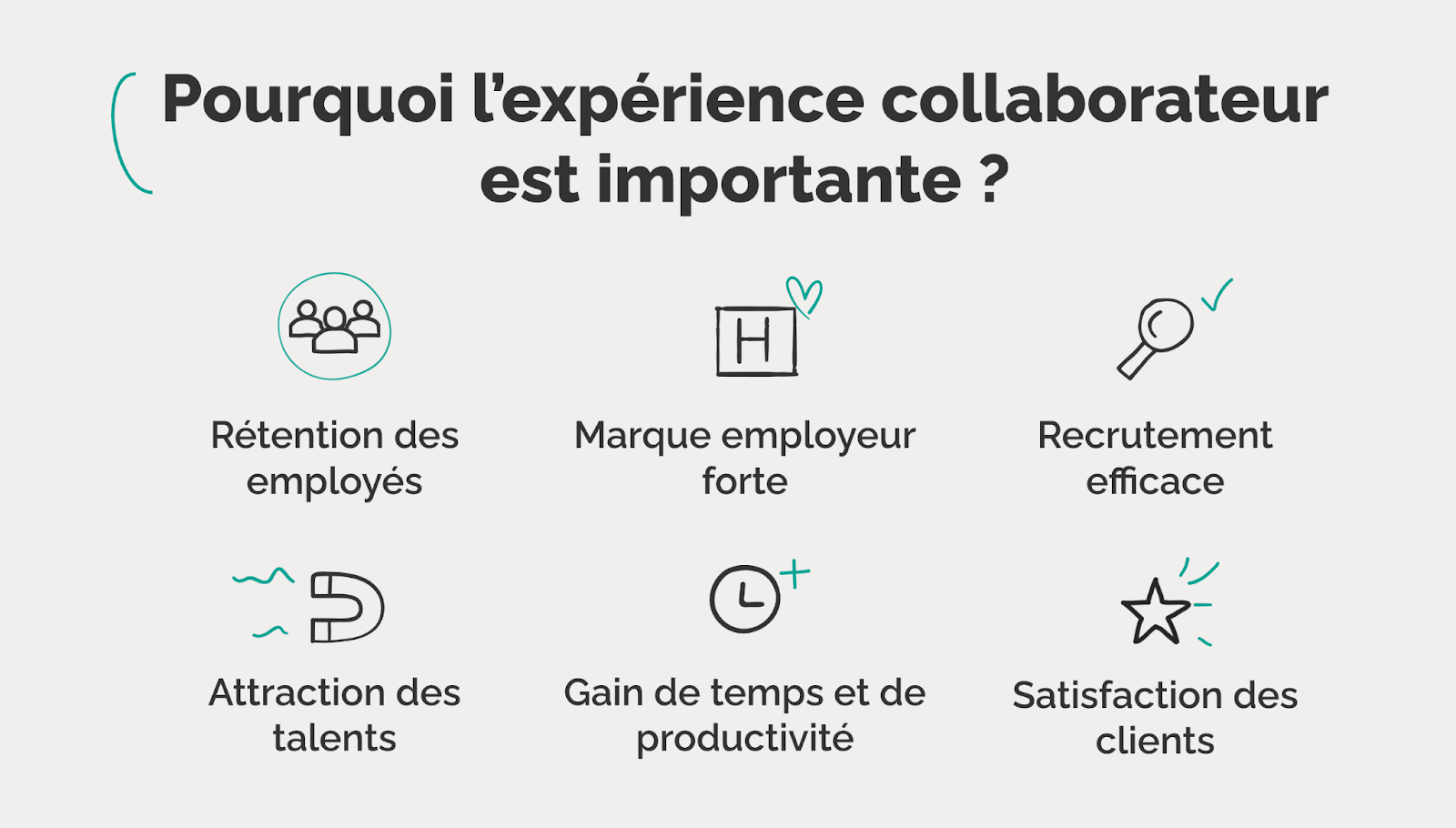

The employee experience in the hotel industry [1/3]
How to deal with the current constraints of personnel in the hotel industry? How to recruit and ensure the loyalty of your employees nowadays?

There is no denying that the hotel market is "scarce", with the pandemic upsetting an already fragile balance and increasing the labour shortage. It is increasingly difficult to fill all positions, and many graduates leave the profession as soon as they gain experience. The tables have turned: candidates are now demanding better conditions and recruiters have been forced to rethink what they have to offer them.

This is what an independent hotelier had to say during our webinar on the topic:
I feel helpless about it and it is not for lack of trying several solutions (such as a 3 or 4 day week, a time-off schedule made by the employees themselves...). The problem for me is also the lack of motivation (seasonal contracts) and both mine and my permanent team's weariness.
What is the employee experience?
Employee experience is a relatively new term that encompasses each area of work and interactions at work that impact the life of the employee, from recruitment to hiring, and throughout their time at the organisation.

The employee experience is made up of a series of components, each of which includes several elements:
- Recruitment: the application platform/career site, job advertisement, hiring procedure, exchanges with the recruiter, job offer, signing of the contract...
- The employee welcome: briefing before arrival, access to the premises, contact with the team, support, the Welcome Pack, the office, resources...
- Onboarding / induction: training, support, guides, in-house vocabulary, company culture, organisation of departments, introduction to employees, first lunch...
- Follow-up training: progress made during training, trial period...
- Daily life: contact with the manager, mobility, workspace, tools available, internal events, contact with colleagues, organisation, internal social network, intranet, internal communication, atmosphere, informal moments, facilities...
- Monitoring progress: annual reviews, performance, skills development, training, business applications, projects...
- Retention / departure / retraining
All of these elements must be taken into account when evaluating the employee experience
Why is the employee experience important?

Mastering and improving the employee experience has many benefits:
- Stronger employee commitment 👥
Capitalising on employee commitment brings many short and long term benefits: group cohesion, employee communication, talent emergence, better flexibility, brand awareness, etc.
- Better employee retention 📍
Happy employees are more likely to stay with and invest in their company. It is more beneficial for the company to retain employees rather than continually changing them. A better employee experience reduces turnover and retains existing talent.
- A strong employer brand 🏨
The employer brand is the reputation of the brand among job applicants, it directly influences the number and quality of applications the institution receives. It also helps an institution to differentiate itself from other companies.
- More efficient recruitment 🔍
The stronger the employer brand, the less the institution has to invest in recruitment, and the faster it will be to find someone who is the right fit.
- Better talent attraction 🧲
Another result of a strong employer brand is the ability to attract the best candidates for its positions, who may even end up changing jobs in order to stay with the company.
- Save time and increase productivity ⏱️
The less time a company has to invest in recruitment, the more it can focus on the experience of its employees and think about improving their working conditions, resulting in better productivity and employee satisfaction.
- Guest satisfaction 🛎️
Happy employees make for happy guests and therefore a healthier business. You can't expect happy guests when your workers are mistreated.
" Take care of your employees, they will take care of your business." - Richard Branson, Founder of Virgin Group
Part I. Recruitment
What is the current state of recruitment in the hotel industry?
Recruitment in the hotel industry was a problem even prior to the pandemic, but the health crisis has not helped the situation. It is estimated that the the hotel industry has lost 237,000 employees due to some staff not returning to their jobs and other employees losing their jobs.
Recruiting for any position is difficult, whether it be receptionists, chambermaids, clerks, and all other staff. Management positions are no exception, and the shortage of managers is evident in all areas of the hotel industry and in every hotel.
However, new initiatives have been launched by some major operators, opening the door to a new transition phase where the sector will learn to adapt to the new situation.
What are these new initiatives?
Some companies organise dedicated recruitment events, a good example is the InterContinental Hotels Group Hôtel-Dieu in Lyon with its recruitment festival which allows potential candidates to come and meet the teams and discuss without the pressure and the challenge of an interview.
Another interesting initiative to improve the integration of new employees is to allow them to experience the hotel for themselves, by allowing them to spend a night in the hotel and test the services.
Focusing on new non-hotel profiles is also a way of opening up recruitment possibilities: senior profiles, applicants from different professions (aesthetics, etc.), young people who have dropped out of school, refugees, etc. The challenge is to train them over time and to set up dedicated training programs.
Encouraging internal mobility is also a way of developing staff's skills and increasing their loyalty. In order to do this, some establishments set up "Vis ma vie" (Live my life) sessions between the different teams to allow the different employees to follow the daily life of those working in different roles within the hotel, which can also help when replacing staff.
Is it the recruiters or the candidates who have evolved?
Candidates have driven the change that is taking place in the industry.
Hotel job ads are proof of this, which now communicate to candidates what the job can offer and highlight their competitive advantage in terms of employee experience: the working atmosphere, development opportunities, level of contact with the manager, their exposure at work, but also a certain flexibility.
As a result, work values have changed enormously, and personal life has become much more important than before.
Is it a good idea to recruit from other sectors?
A few years ago, Starwood Hotels' W brand emphasized the fact that it was looking for profiles other than purely hotel profiles when it opened its hotel in Paris. It is in the sector's interest to open its doors to other profiles because there are many candidates with a hotel background who do not end up working in the sector. The solution is to spread this message more generally, as candidates can be recruited on their interpersonal skills, which are more difficult to acquire than technical skills.
Opening up recruitment to non-hotel profiles is therefore an excellent tactic for attracting candidates who were not initially planning to work in the industry, but who are looking to learn a trade and develop professionally through the social ladder that the sector offers. These types of candidates also tend to be extremely loyal to the institution that offered them the job.
Which recruitment strategy should be adopted at the moment? How can you pick the right candidates?
Recruitment is a strategy that is itself embedded into the company's overall strategic approach. It is a value to be maintained within the teams. This requires training and learning the key skills of recruitment: who to recruit, for what needs, how to organise applications, how to present the company, how to make an offer, etc. In order to define this value properly, it is necessary to think strategically beforehand (particularly about the employer brand) and to take the time to properly organise everything. Disorganisation can be very costly.
Feedback from Holiday Inn Express Paris CDG
by Arnaud Vermerie, General Manager Holiday Inn Express Paris CDG Airport and President of the AICR

It has become too common for a new employee to be put behind a computer straight away and not be given the time to be trained, mentored and shown around the company.
We used to use a temporary work company, but the main problem is that these workers, more often than not, do not have the skills of permanent employees and have a high hourly rate. There is a lot of exploitation associated with this type of work, as these agencies charge you for services without job consistency, which can cause you as an employer to lose credibility with your permanent staff.
It is therefore preferable to offer overtime to staff rather than use temps. Beware of overtime: goodwill is the key to a company's success, it takes time but it pays off.
We also put in place an internal training strategy for our 50 employees. To do this, we asked ourselves several questions: What am I willing to invest? When (after the end of the trial period)? Which program? In-house training (by employees)? Or external training?
Should you be honest about the difficulty of the job?
To attract candidates, there may be a temptation to embellish or downplay the difficult aspects. There is a balance to be struck between the promise of a dream and the reality. The narrative needs to be honest, truthful and evidenced, because as early as the onboarding process, employees will become aware of the job conditions. This can be done by listing examples of the real difficulties the employee may encounter in the position and how to deal with them.
It is also important to be honest about the structure of the establishment from the recruitment stage, as not all hotels can offer development opportunities. It is wiser to decline very good candidates in relation to their career goals if they are not in line with the development oppurtunities within the establishment. If there is little turnover at the management level, there are fewer career opportunities for candidates.
What about candidates who don't show up for interviews?
It is clear that the candidates hold all the cards. That doesn't mean you have to give in to their every whim, but you have to be flexible.
There is a phenomenon called"ghosting": candidates who do not respond to messages or calls or do not go to interviews. From the recruiters' end, it is actually companies who do not respond to applications.This is a significant problem, as between 30% and 40% of candidates never get a response.
Many establishments have started up too quickly, with an insufficient workforce, in complicated circumstances, without taking the time to train or motivate the workforce in recruitment management. Ghosting is obviously a lack of respect, but it is a two-way street. It is something to watch out for as it impacts the employer image.


For more information on this subject, watch our webinar on the employee experience:
Webinar speakers:
- Séverin Ferrand, Associate Director , UPSCALE HR Consulting
- Charline Ouarraki, Project Manager Pedagogical Coordinator ASFOREST
- Arnaud Vermerie, General Manager Holiday Inn Express Paris CDG Airport President AICR
- Bruno Lanvin, Head of Customer Training and Education LoungeUp, Volunteer WorldSkills



